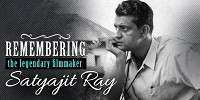Satyajit Ray
Read the following passage carefully:
In 1977, Satyajit Ray started shooting a historical film based in Awadh of 1856, in the reign of Nawab Wajid Ali Shah. It falls into our discussion of 1857 films because of its plot centring the British takeover of Awadh, which has been cited as one of the causes that triggered the 1857 uprising in the region. The film has two parallel narratives, one based on Munshi Prem Chand’s short story of two chess-playing jagirdars, who remain absorbed in their games of chess while the British moved into Lucknow, the other dramatizing the takeover of Oudh by the British under General Outram.
The film has a strain of nationalist sentiment in its concession of the treacherous ad of Dalhousie’s takeover of Awadh, the frustrations of the Nawab, and Outram’s own discomfort with the course of events. Yet, it is a new genre of 1857 historical with its overt subtext of historicity, and its departure from the established elements of the historical genre that were available in Jhansi Ki Rani——the film builds on research and recorded history and dispenses with the larger-than-life element established by the genre. Rather than intense engagement as called for by the heightened use of character and action in the conventional historical, the voice-over punctuating the diegesis gives the sense of a fait accompli establishing distance from the unfolding historical events.
Ray was India’s most famous filmmaker and his films automatically generated a series of assumptions about the quality and value of the product. Shatranj Ke Khilari was meticulously researched and period reconstruction undertaken in the minutest of detail. Filmfare, which had been following the shoots since its 7-20 January 1977 issue, for instance, revealed in its 18 February-3 March issue that actor Amjad Khan, who plays Wajid Au Shah in the film, was being trained in Kathak dance, for scenes in the film that had Wajid Au performing the Raas-Leela with his nautch girls. Cooper mentions that Ray’s research on Wajid Ali Shah had revealed, according to Ray, Wajid’s “extraordinary character”, which “made the king a figure worthy of the film treatment.” (Cooper, 198).
In response to a critic’s comments in the 22 October 1978 issue of The Illustrated Weekly of India that Ray had been “Orientalist” in his depiction of Wajid Au as weak, ineffectual and effeminate. Ray himself declared many of the sources he had consulted while making the film in the 31 December 1978 issue of the magazine. These included among other contemporary sources, Abdul Halim Sharar’s Guzesta Lucknow, which provided both the socio-cultural details and a portrait of Wajid in Lucknow and Calcutta, the text of Wajid Au Shah’s Rajas, where he plays Krishna, and the young Wajid’s personal diary, Mahaj Khana Shahi (Cooper, 199).
— ‘Yojana’
1.Complete the following statements:
(1) The historical film produced by Satyajit Ray had the background of _______
(2) Lord Dalhousie’s takeover of Awadh was ____________
(3) The film dramatized
(i)_______________________
(ii)_____________________
(4) Satyajit Ray’s film was different from a conventional historical film in that it ____________
2. Fill in the blanks with ONE word only:
Satyajit Ray was India’s most distinguished (a) _____________ . The films produced by him are known for their superb (b) _____________ . He did a lot of (c) _____________ work before producing any film of the great (d) ____________ he always aimed at.
3. Find words in the passage that mean the following:
(a) very carefully (Para 3)
(b) womanish (Para 4)
Download the above Passages in PDF (Printable)
More Comprehension Passages:-
Passage -65 CHILDREN (500 Words Subjective Unsolved)
This children essay describes children activities which include children education and children English. Children in India are still not given proper importance so these children literature will help you to understand children learning and children meaning. Go through to know how children playing and children reading both are important factors-
Passage -66 Beti Bachao Beti Padhao (450 Words Subjective Unsolved)
Passage -67 Importance of Cleanliness (500 Words Subjective Unsolved)
Passage -68 Tourism Potential (500 Words Subjective Unsolved)
Passage -69 Issues of Corruption (450 Words Subjective Unsolved)
Passage -70 Beautiful Mountain Village (400 Words Subjective Unsolved)
Passage -71 Martin Luther King (500 Words Subjective Unsolved)
Passage -72 Mystery of Shining Stones(465Words Subjective and Objective Solved)

